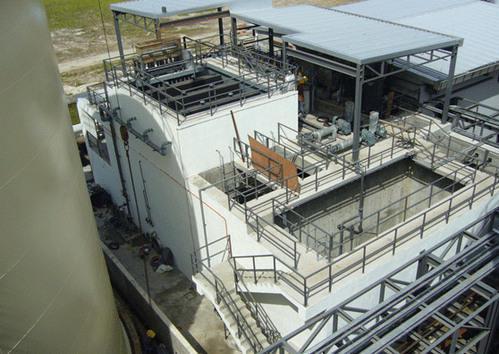Electrocoagulation in Industrial Wastewater Treatment Process- Who, What, When, Where, Why, How

Thinking about implementing electrocoagulation (EC) into an industrial wastewater treatment system process, but not sure why you should or what it can do? Well, here are a few things to consider when choosing an Electrocoagulation system for industrial wastewater treatment applications:
WHO can use it?
An easier question is, “Who can’t use it?”
Answer: Almost no one! EC is extraordinarily versatile and can be used to treat wastewater from a wide range of industries including the following industries:
Petrochemical
Oil and Gas
Power Generation
Mining
Food and Beverage
Textile
Pharmaceuticals
Pulp and Paper
General Manufacturing
WHAT can Electrocoagulation be used to treat?
also ~
WHAT should be considered when selecting a system?
Answer 1:
Electrochemical systems can remove or reduce many different constituents such as:
TSS (Total Suspended Solids)
Volatile and colloidal organics including arsenic, silica and certain pesticides.
Emulsified Oils & Hydrocarbons
Heavy metals including chromium 6, fluoride, lead, iron, manganese and others.
Fats, Emulsified Oils & Greases
Bacteria, viruses, cysts, and parasites.
Odor-causing compounds such as hydrogen sulfide.
Hardness minerals such as calcium and magnesium.
Color
COD/BOD
Phosphorus
However, electrocoagulation typically is not effective in removing small molecules that are easily dissolved in water, such as chemical solvents, and minerals such as sodium.
Answer 2:
There are a few considerations to be made during system selection and design that can depend on the types and concentrations of the influent constituents listed above. Considerations include:
Current
The current supplied to the electrodes needs to be carefully optimized. Higher current can increase the rate of coagulation (up to a point) but it will also cause the electrodes to corrode faster increasing operating costs.
Reaction Time
Electrocoagulation can take anywhere from minutes to hours to complete depending on the water source. However, faster times may mean more power draw and faster electrode corrosion, if there is no continuous recirculation loop.
Flow rate
A proper flow rate is needed to ensure that the process is as efficient as possible.
pH
Based on the constituents in the solution, the pH will need adjustment or the process may not work properly or optimally to meet treatment limits.
Electrode materials, size, and configuration
Certain electrode materials are needed for certain types of contaminants.
Electrode size will optimize the current density. Electrode configuration will ensure that the current is carried through the solution evenly.
WHEN should we consider implementing electrocoagulation?
Answer:
When you decide you want a more efficient, cost effective, sustainable industrial wastewater treatment process! If you’re concerned about having to do a complete retrofit of an already exisiting system, go modular. A modular Electrocoagulation system can be designed and retrofitted into your current system based on input and output flow rates.
WHERE can it be used?
Answer:
Physical location? Electrocoagulation units aren’t very large so they can fit easily into an industrial facility. In a treatment process? Typically at the beginning after coarse screen pretreatment and a grit chamber. However, it can also be used in a secondary polishing treatment application for the treatment of heavy metals, etc. Whether you’re treating wastewater or process water, an EC system will reduce/remove particles as well as organics, certain chemicals, and microbiological organisms prior to clarification and any tertiary treatment.
HOW does it work?
Answer:
Through the power of oxidation! In a basic bench scale set-up, there would be a pair of metal electrodes — one cathode and one anode — that would be connected to a power source. When the power is supplied, the cathode begins corroding due to oxidation whereby, the metallic ions lose electrons and the ions themselves will disperse into the solution. The influent solution will have an overall charge that prevents the particles from falling quickly due to mutual repulsion. With the addition of the metal ions from the cathode, the charge of the solution will become more neutral, destabilizing the solution and allowing the solids to agglomerate. Meanwhile, the anode actually creates small bubbles in solution that can float the lighter solids — like colloidal particles, fats and oils — to the top of the treatment tank.
WHY should we use it?
Answer:
Because it’s reliable, efficient, and cost-effective. An Electrocoagulation system is designed to decrease treatment time, all of the constituents mentioned above, operational costs, and maintenance costs, allowing you to increase your treatment efficiency. It has been shown that using clean, well treated water in industrial processes can improve process efficiency and EC can help get it there in a sustainable way. With cleaner water, there is a reduced need to perform ongoing maintenance on downstream processes. In addition, using electrocoagulation, you can reuse your wastewater and not spend extra money purchasing fresh water.
The EC system itself is simple to install, simple to use, and easy to maintain via system automation. The only additives to consider are for pH adjustment as necessary, and electrode materials are typically inexpensive to replace. The electrodes will require replacing from time to time, but with responsible operation and maintenance, the replacement life can be extended.
Now, you may have one final question. It could be a who, or a where, or a how, but essentially it’s:
What reliable source can we procure a treatment system like this from?
Answer:
Genesis Water Technologies! GWT has always been a proponent of utilizing advanced and innovative technologies in municipal and industrial wastewater treatment systems. Our specialized electrocoagulation system solution is no exception. We have worked hand-in-hand with our clients and authorized partners to design, supply, and implement EC systems that are simple, reliable, efficient, and cost-effective in the name of sustainability.
Want to learn how a GWT specialized electrocoagulation treatment system could benefit your industrial wastewater treatment needs? Reach out to us today at 1-877-267-3699 or contact us via email at customersupport@genesiswatertech.com for a free initial consultation to discuss your application and treatment goals.

